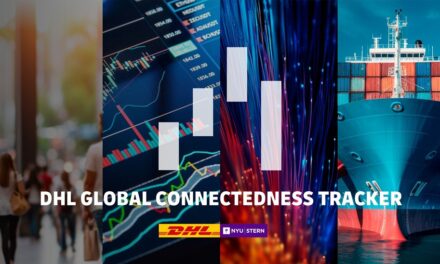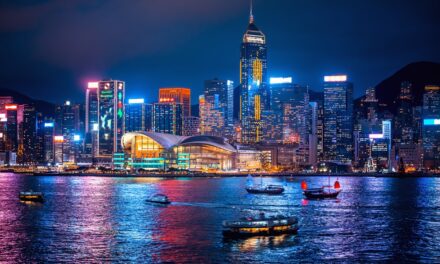
Allan key to savings from integrating new DHL logistics arms
DHL logistics boss John Allan is learning German, but he relied on old Scottish to sum up the E 220m ($271m) of savings his team will extract from the billion euro turnover business by spring 2007: 'Many a mickle makes a muckle' or every little bit helps.
Mr Allan stresses that his three hours a week battle with German grammar is fulfilling a lifelong desire, and is not a Deutsche Post head office edict from the parent company in Cologne: 'Deutsche Post is an international company and the working language is English. It is a case of wanting to learn German, rather than needing to.'
It was in September last year when Germany's letters to logistics kraken Deutsche Post confirmed the City rumour-mill by offering GBP3.7bn ($6.7bn) to acquire UK-based supply chain and forwarding giant Exel, with the latter's chief executive chosen to head the new division and to lead the integration.
'I was asked to stay on,' says Mr Allan, who states that his presence gives 'continuity' to the integration process, just as it did when his Ocean Group merged with the 'old' Exel in 2000 to create what was then the largest UK-headquartered global logistics player.
DP chief executive Klaus Zumwinkel, Mr Allan's 'new boss', was a well-known and respected rival: 'I got a call from Klaus at the end of August, when he told me that he had a business proposition and that we should meet.
'I gathered from the nature of the phone call that it was a serious matter. It ended up with the formal offer for Exel, all in less than three weeks.'
Was it a surprise? 'I would not say that the offer was a strategic shock. There was a lot of speculation that DP might like to bid for us. But it was tactically a surprise, in the sense that we had not had an approach in the past.'
Mr Allan says that logistics strategies of DP and Exel were 'very similar' in terms of how to develop the freight forwarding and contract logistics businesses: 'There has not been a great deal of debate about strategy, because both sides had embarked on an almost parallel but still converging course.'
He now heads a business with nearly 150,000 staff worldwide. Exel had a total turnover of € 11bn in 2005, while the DHL logistics business recorded €8bn. As a result of the takeover, the new logistics entity is divided into two divisions: DHL Global Forwarding (formerly DHL Danzas Air ' Ocean), handling air freight, sea freight and major logistics projects, and DHL Exel Supply Chain (formerly DHL Solutions) which deals with contract logistics.
Says Mr Allan: 'There is a big job of integration which will take us until the spring of next year. It has been planned in very great detail over the last three or four months.
'The first clean year, when all the integration is complete, is 2008, and that is the year when we will deliver at least €220m of savings.'
Logistics rivals see such internal spring cleaning as an ideal time to poach customers. Mr Allan is not so sure about that interpretation.
'Our priority is not to allow our internal implementation activities to get in the way of providing a good service and paying attention to our customers. We are giving just as much energy to that, as to the physical integration.'
He said that such speculation was indicative of a 'legitimate risk', but countered: 'Yes, it is plausible what a competitor had to say, but perhaps a better way of putting it, is wishful thinking.
'The interesting thing in the experience thus far is that we have had very few customer losses.
'Where people have exercised change of control clauses and you can count those on the finger of one hand they have not done so to give our competitors the business. That has not been not their motive.'
So where will the internal savings come from within the new DHL logistics giant?
'Many a mickle makes a muckle. It comes out of a large number of small integration activities. There are savings in the UK because some of the Exel head office activities are not now needed, investor relations for example.
'There are savings from combining our management teams country by country around the world. In many airports and sea ports where we have offices, you will typically achieve some savings from rental. We have over a thousand integration programmes, requiring a lot of activity at a very detailed level. So, no big bang but lots of little things.'
Over the last 10 years, Deutsche Post has made a name for itself as a deep-pocketed, all-consuming predator spending billions of euros worldwide to acquire the very best in freight forwarding and logistics.
Is Exel the last piece in the jigsaw, or is there one final logistics trophy waiting to be bagged?
Mr Allan thinks that Germany's big game hunter has fired his last shot: 'Our position is that the platform is in place, we are number one in logistics by a mile, worldwide, and we are number one in forwarding.
'We are everywhere we would want to be, and therefore no necessity for further major acquisitions,' in fact, the 'emphasis will be on organic growth rather than acquisitions'.
He added: 'The major challenge for me and my team is to carry through the integration and then demonstrate that we can make a very large business grow and be attractive to our customers.'
Mr Allan says that another way of looking at it, is that being the biggest is only the start: 'What really matters is that can convince our customers that by being the biggest we can also be the best. The challenge is to prove to customers that we have the resources to bring them innovative services and to create more value within their supply chains.'
Mr Allan says that integration is a means to an end, and not an end in itself: 'The real proof is not just that we have completed the mechanics, the nuts and bolts of knitting it together without losing critical customers.
'That is a very important set of hurdles to get over, but at the end of it, have you got something that will powerfully win business, and grow and prosper. Having built the boat, can you sail in her?'
But if the logistics middlemen have been consolidating, so have the shipping lines, and now the port owners too.
Mr Allan feels that container line mergers and port consolidation are naturally occuring events that Deutsche Post has to learn to live with and 'to manage to the best of our ability'.
'In the ports, what matters to us and to us and to our customers is that governments and companies are prepared to invest in infrastructure so that the benefits of world trade can flow through.'
Looking ahead, the DHL logistics boss sees a further extension of current trends, not least of which is globalisation. But he also sees China and India, currently places of production, becoming stronger and stronger as end markets in their own right, as the purchasing power of consumers continues to grow.
Given his experience and age, just 57, does Mr Allan harbour any ambitions for the top job at Deutsche Post?
'Absolutely not. I have done the chief executive of a public company thing. I have a very interesting job to do for the next few years.
'Once that job is done, I will probably feel like doing something completely different. So I have got plenty to do to keep me busy for the next few years.'












